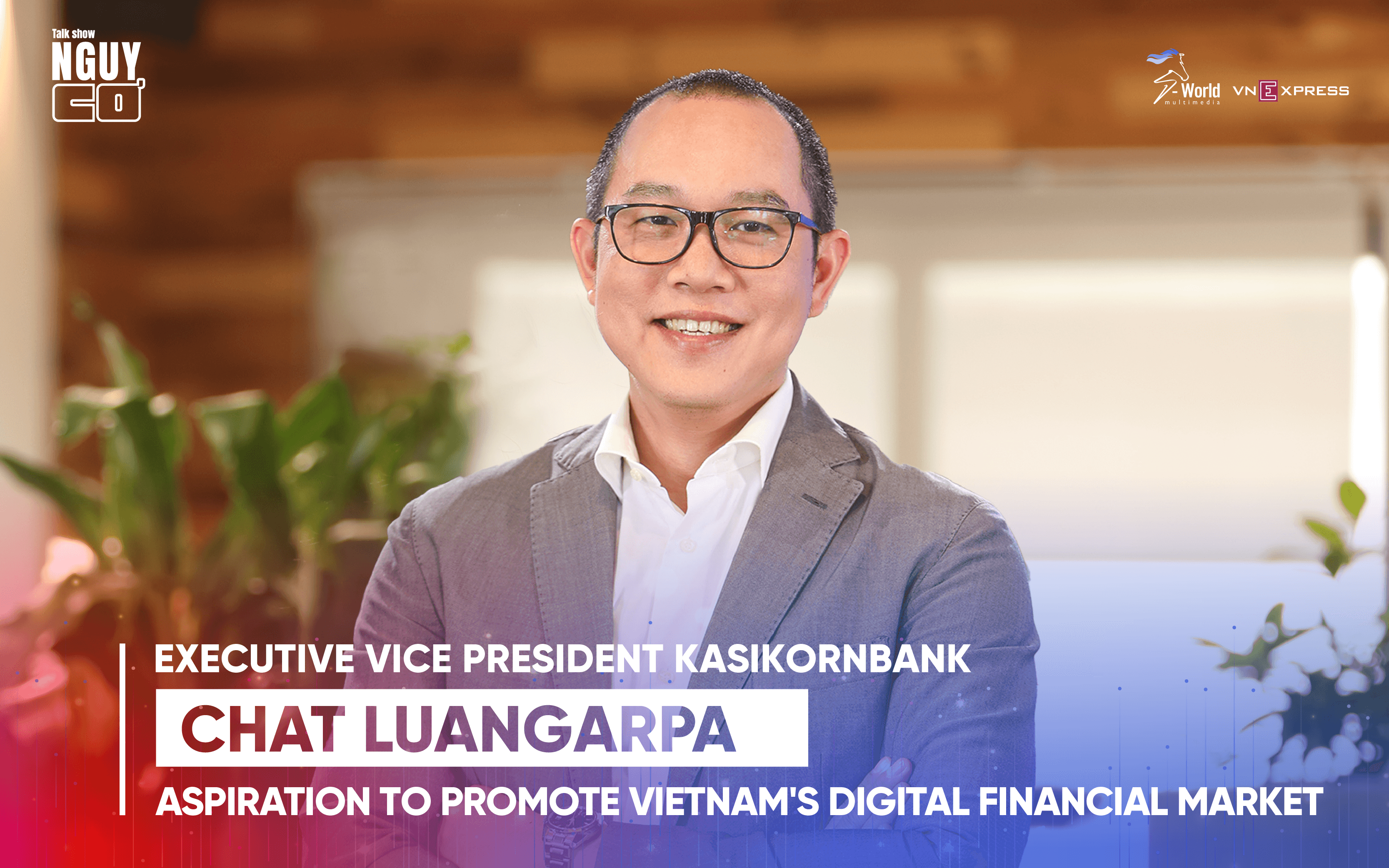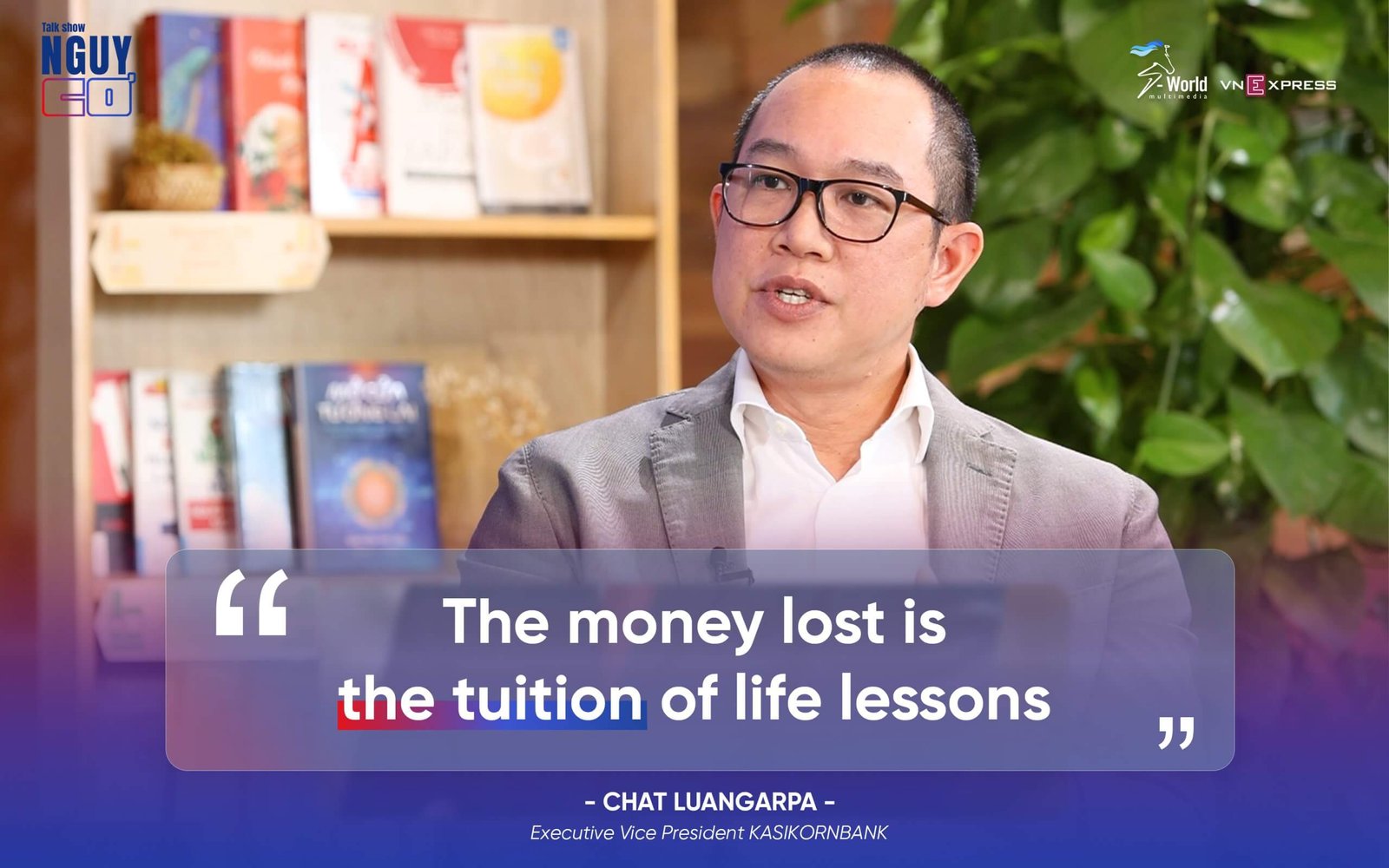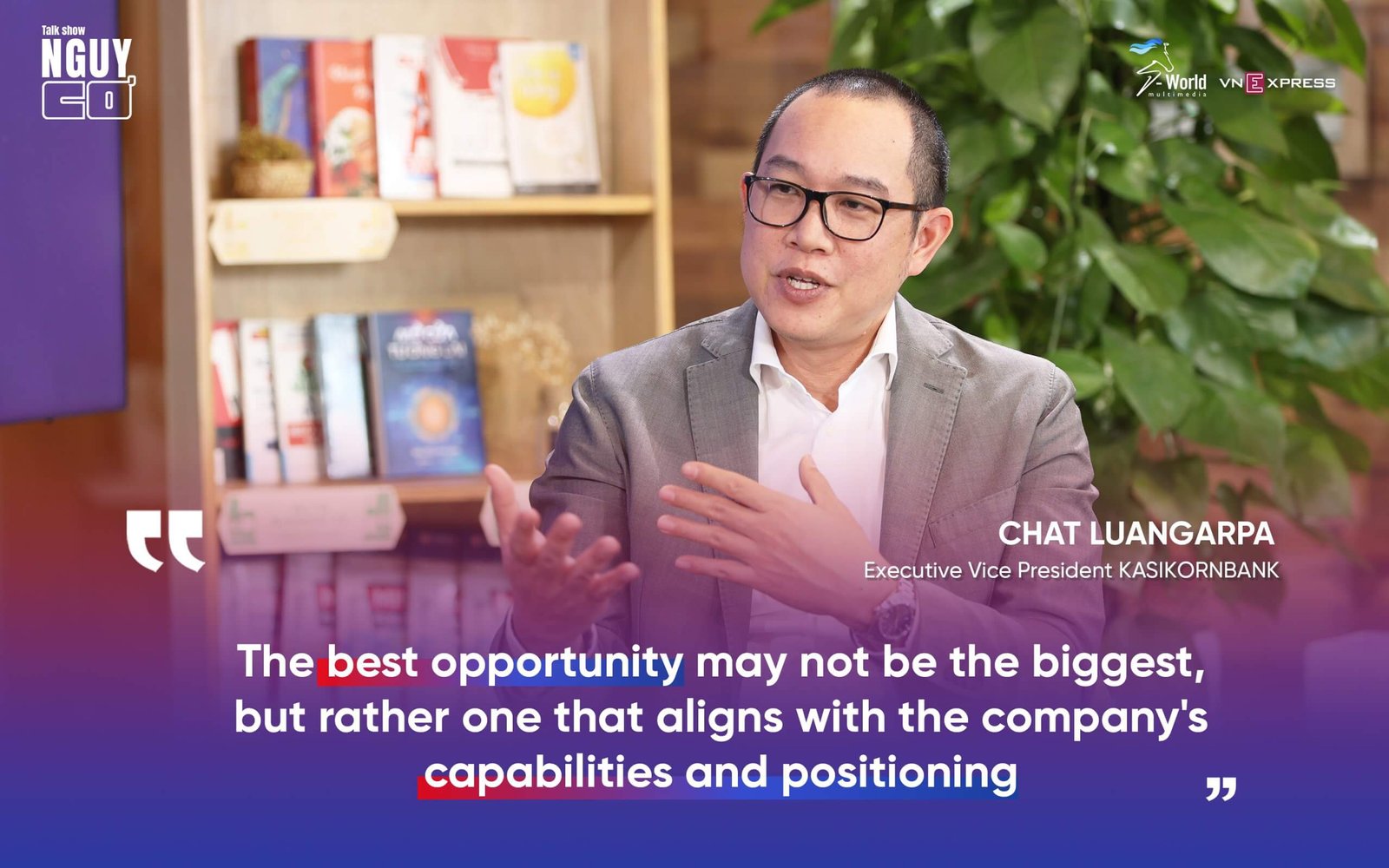
#29 | KBank Thailand: Vietnam will be the driving force behind the expansion of Southeast Asian economic ties.
Kasikornbank (KBank), one of Thailand’s largest commercial banks with the history dating back over 77 years, has announced plans to open a branch in Vietnam in November 2021. Recognizing Vietnam’s growth potential in the financial technology (fintech) sector, the Vietnam branch seeks to connect and serve not only Thai businesses in Vietnam, but also other domestic and foreign-invested enterprises in Vietnam.

On Nguy Co Talkshow, Mr. Luangarba also discussed the reasons for KBank’s entry to Vietnam, as well as the specific fintech solutions for Vietnamese customers that the bank brought to this 100-million people market. He also stated that the Vietnamese market will continue to have many opportunities to grow in the future, particularly the contribution of small and medium-sized enterprises (SMEs) and retailers to the national economy.
Vietnam is KBank’s major Southeast Asian connection point.
Businesses should carefully consider every investment decision in the context of the global economic downturn. Nonetheless, KBank chose to enter the Vietnamese market with the goal of leading the corporate and retail customer segments, serving over 1.2 million customers and disbursing more than $500 million by 2023.
“ASEAN countries are becoming more connected. Because of the separation between East and West, Southeast Asia has emerged as the new engine of global growth. As a result, Vietnam will take the lead in this growth cycle” Mr. Luangarpa predicted.
According to the Vice President, Vietnam has a large domestic market and numerous development opportunities. Currently, a large number of people do not use banking or financial services. According to a 2021 report by UK-based Merchant Machine, up to 69% of the Vietnamese population will be unable to access or use banking and financial services. This appears to be a promising market for KBank or other financial investors looking to expand in this 100 million-person market.
Furthermore, Vietnam is a significant manufacturer and exporter of high-value goods, not only as Original Equipment Manufacturers (OEMs), but also as local brand products. As a result, Vietnam will continue to attract foreign direct investment (FDI), and export activities will expand in the future.
Despite the fact that the global economy is in decline, the representative stated that this is a global phenomenon that affects everyone, and that the country that emerges from the crisis first will be the one with strong growth. He believes Vietnam will remain one of the best places to do business.
“The global phenomenon (recession) has an impact everywhere. So we don’t have to be concerned about this headwind. Of course, everything will be a little slower, but in the end, everything depends on the foundation and growth momentum in each country” Mr. Luangarpa shared his thoughts on the impending recession.
KBank recognized the outstanding development of SMEs, one of the Vietnamese economy’s growth resources, when it first entered the Vietnamese market. According to statistics, Vietnam has millions of SMEsthat contribute more than 40% of the country’s economy and will continue to grow in the future.
Banking and finance are two industries that compete fiercely in the Vietnamese market. According to Dr. Nguyen Quoc Hung, Secretary General of Vietnam Banks Association (VNBA), the number of businesses in the financial technology sector in Vietnam has increased fourfold from 2016 to the present, from 40 to more than 150.
Mr. Luangarpa also discussed the key factors that influence customers’ decisions to use and invest in banks, particularly KBank. In addition to the usual factors such as the bank’s reputation and stability, Mr. Luangarpa recommended that consumers or businesses should consider banks with strong technological capabilities, because technology will become the core competence of not only banks but also all businesses in the future.
Bringing technology to banking segment
Typically, engineers or people in the technology field are uninterested in working in the banking sector. They are motivated to work in technology companies. KBank, on the other hand, decided to invest in creating a technology environment in which technology engineers can do specific jobs with them and be compensated appropriately.
KBank’s technology branch, KBTG Company, currently employs 2000 IT engineers. When the KBTG branch in Vietnam is established, the company expects to attract more than 100 IT engineers working in Ho Chi Minh City. This has the potential to contribute to the development of Vietnam’s financial technology sector in the future.
Thai Van Linh, the show’s host, stated that technology will undoubtedly be a good growth area in the future, and that this field requires innovation, with businesses constantly looking for new ideas and concepts so that theycan continue to expand.
KBank aims to focus on financial technology as a core competency, but as mobile devices become an integral part of life, the company does not only present the banking sector, but also other sectors such as healthcare, education, shopping, and so on.
“In the early stages, when we were expanding markets in the region, we developed a partnership strategy because we knew we needed to immerse ourselves in the lives of our users” Mr. Luangarpa shared his thoughts on the company’s future development plans.
When entering the Vietnamese market, KBank must provide products and services that meet the needs and habits of the Vietnamese consumers. KBank has used a variety of methods to bring banking services into its technology ecosystem, including supporting retailers, SMEs not only in traditional business but also on the digital business side.
“When investing in any industry, we consider how it will benefit people’s lives, not just finding a company that will grow quickly. We are concerned about the long term” said the Vice President.
Mr. Luangarpa also stated that, while KBank is not currently investing in finance-related technologies such as blockchain. He did, however, mention that, in addition to investing in this technology platform, KBank chose to shift its focus to the healthcare, education, trade, and logistics industries.
“People require education and healthcare, but how can the effort required to meet these needs be reduced? We believe that incorporating technology into these industries will make operations more efficient and people’s lives better” the businessman explained.
Kasikornbank (KBank), one of Thailand’s largest commercial banks with the history dating back over 77 years, has announced plans to open a branch in Vietnam in November 2021. Recognizing Vietnam’s growth potential in the financial technology (fintech) sector, the Vietnam branch seeks to connect and serve not only Thai businesses in Vietnam, but also other domestic and foreign-invested enterprises in Vietnam.

On Nguy Co Talkshow, Mr. Luangarba also discussed the reasons for KBank’s entry to Vietnam, as well as the specific fintech solutions for Vietnamese customers that the bank brought to this 100-million people market. He also stated that the Vietnamese market will continue to have many opportunities to grow in the future, particularly the contribution of small and medium-sized enterprises (SMEs) and retailers to the national economy.
Vietnam is KBank’s major Southeast Asian connection point.
Businesses should carefully consider every investment decision in the context of the global economic downturn. Nonetheless, KBank chose to enter the Vietnamese market with the goal of leading the corporate and retail customer segments, serving over 1.2 million customers and disbursing more than $500 million by 2023.
“ASEAN countries are becoming more connected. Because of the separation between East and West, Southeast Asia has emerged as the new engine of global growth. As a result, Vietnam will take the lead in this growth cycle” Mr. Luangarpa predicted.
According to the Vice President, Vietnam has a large domestic market and numerous development opportunities. Currently, a large number of people do not use banking or financial services. According to a 2021 report by UK-based Merchant Machine, up to 69% of the Vietnamese population will be unable to access or use banking and financial services. This appears to be a promising market for KBank or other financial investors looking to expand in this 100 million-person market.
Furthermore, Vietnam is a significant manufacturer and exporter of high-value goods, not only as Original Equipment Manufacturers (OEMs), but also as local brand products. As a result, Vietnam will continue to attract foreign direct investment (FDI), and export activities will expand in the future.
Despite the fact that the global economy is in decline, the representative stated that this is a global phenomenon that affects everyone, and that the country that emerges from the crisis first will be the one with strong growth. He believes Vietnam will remain one of the best places to do business.
“The global phenomenon (recession) has an impact everywhere. So we don’t have to be concerned about this headwind. Of course, everything will be a little slower, but in the end, everything depends on the foundation and growth momentum in each country” Mr. Luangarpa shared his thoughts on the impending recession.
KBank recognized the outstanding development of SMEs, one of the Vietnamese economy’s growth resources, when it first entered the Vietnamese market. According to statistics, Vietnam has millions of SMEsthat contribute more than 40% of the country’s economy and will continue to grow in the future.
Banking and finance are two industries that compete fiercely in the Vietnamese market. According to Dr. Nguyen Quoc Hung, Secretary General of Vietnam Banks Association (VNBA), the number of businesses in the financial technology sector in Vietnam has increased fourfold from 2016 to the present, from 40 to more than 150.
Mr. Luangarpa also discussed the key factors that influence customers’ decisions to use and invest in banks, particularly KBank. In addition to the usual factors such as the bank’s reputation and stability, Mr. Luangarpa recommended that consumers or businesses should consider banks with strong technological capabilities, because technology will become the core competence of not only banks but also all businesses in the future.
Bringing technology to banking segment
Typically, engineers or people in the technology field are uninterested in working in the banking sector. They are motivated to work in technology companies. KBank, on the other hand, decided to invest in creating a technology environment in which technology engineers can do specific jobs with them and be compensated appropriately.
KBank’s technology branch, KBTG Company, currently employs 2000 IT engineers. When the KBTG branch in Vietnam is established, the company expects to attract more than 100 IT engineers working in Ho Chi Minh City. This has the potential to contribute to the development of Vietnam’s financial technology sector in the future.
Thai Van Linh, the show’s host, stated that technology will undoubtedly be a good growth area in the future, and that this field requires innovation, with businesses constantly looking for new ideas and concepts so that theycan continue to expand.
KBank aims to focus on financial technology as a core competency, but as mobile devices become an integral part of life, the company does not only present the banking sector, but also other sectors such as healthcare, education, shopping, and so on.
“In the early stages, when we were expanding markets in the region, we developed a partnership strategy because we knew we needed to immerse ourselves in the lives of our users” Mr. Luangarpa shared his thoughts on the company’s future development plans.
When entering the Vietnamese market, KBank must provide products and services that meet the needs and habits of the Vietnamese consumers. KBank has used a variety of methods to bring banking services into its technology ecosystem, including supporting retailers, SMEs not only in traditional business but also on the digital business side.
“When investing in any industry, we consider how it will benefit people’s lives, not just finding a company that will grow quickly. We are concerned about the long term” said the Vice President.
Mr. Luangarpa also stated that, while KBank is not currently investing in finance-related technologies such as blockchain. He did, however, mention that, in addition to investing in this technology platform, KBank chose to shift its focus to the healthcare, education, trade, and logistics industries.
“People require education and healthcare, but how can the effort required to meet these needs be reduced? We believe that incorporating technology into these industries will make operations more efficient and people’s lives better” the businessman explained.




